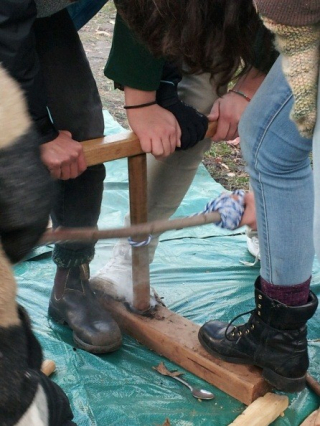Status: COMPLETED Summer 2015 - Summer 2016
SPF0150, Self-Sufficiency Workshops is a series of 8 Sunday workshops (4 in the fall and 4 in the winter) run at the Redpath Museum which teach McGill students basic hands-on self-sufficiency skills. These workshops enable students to explore and share skills needed for self-sufficient living, incorporate materials and create products that are more sustainable than those currently on the market, involve students in discussions about the philosophy of sustainability and foster an empowered relationship with local Canadian nature.
Read the full project description
There is an inherent lack of knowledge about the skills needed for self-sufficient living in urban life today because we rely on corporations for everything from food to cleaning products. Many 1st-year undergrads are not confident in their knowledge of even such a basic skill as preparing food, let alone survival skills such as foraging for edible foods. Each workshop is a 2-hour exploration of a skill needed for self-sufficient, sustainable living.
A series of 8 Sunday workshops for students (4 in the fall and 4 in the winter semester) at the Redpath Museum; free of charge to students. McGill students as well as SSMU clubs who are interested in traditional skills (Flintknapping, Outdoors, etc.), are invited to experience hands-on activities for students during the fall and winter Activities Nights (with the Outdoors Club if they are interested). Each workshop is a 2-hour, hands-on exploration of a skill needed for self-sufficient living.
Topics include: foraging for edible foods; simple shelter building; fire skills; carving and basketry; fermented foods; composting; making your own soap and cleaning products, etc. All materials will be sustainably harvested and/or consist of recycled/reused materials as much as possible. Nature connection (based on the Wilderness Awareness School's Coyote Programs: see Project Plan) and living more sustainably will be an integral component of each workshop. The first two workshop topics will be pre-determined but ideas for the rest will be solicited from participants and decided collectively. If possible, fall participants will return as mentors for the winter series and to present in the Fac. of Education. This peer mentoring is modeled after the Coyote Programs' philosophy and the Redpath Museum Club, a robust student club which has done peer training every term since 2005 and that has found it an effective learning strategy. The group will help guide the mentoring process and students will sign a symbolic letter committing to sharing their learned skills with someone from McGill.
Following each workshop, a film that ties in with the theme of the workshop will be shown as part of the Museum’s public documentary film series; workshop participants will be encouraged to attend these films.
This project will: 1) enable students to explore and share skills needed for self-sufficient living; 2) incorporate materials and create products that are more sustainable than those currently on the market; 3) involve students in discussions about the philosophy of sustainability (environmental, economic, and social) through the skills being developed; 3) empower students to be more self-sufficient; 4) increase students’ contact with nature through the development of naturalist skills; 5) raise awareness of our relationship with nature; 6) sustain traditional skills in the community; 7) connect students with an existing Montreal community with whom, if they choose, they can further explore and share their skills.
This project will help McGill build a culture of sustainability by providing a creative space that emphasizes interdisciplinary learning from each other and from people in the community; this fosters more resilient, sustainable communities. Socio-economic issues will also be discussed as we look at traditional crafts and ways in which they preserve cultural heritage and sources of income for some communities. We will discuss how native peoples have traditionally used these skills to live more sustainably and we will reflect on how
this way of doing things can contribute to our health and sense of wellbeing.
Workshops will all focus on hands-on, experiential learning, and all of the skills that will be taught are related to sustainability on both the environmental and socio-economic. The project will promote lifelong learning and leadership by example (naturalists sharing their skills and stories) and provide participants with resources and connections to continue their own exploration (Montreal opportunities for Skills Shares, etc.) and to mentor others by committing to teaching these skills to someone else in the McGill community.
Resources from the SPF will be used to provide materials, transportation, printing and professional fees for this project.
View photos




Connect with this project
|
